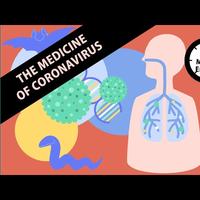The medicine of coronavirus - 6 Minute English - YouTube
Hello. This is 6 Minute English from
BBC Learning English. I'm Neil.
And I'm Georgina.
Covid-19 has changed everyday life for
people in countries around the world.
But coronavirus
wasn't the first pandemic to cause mass
sickness and disrupt daily life.
Between 2002 and 2004 an outbreak
of the disease known as SARS
or 'severe acute respiratory
syndrome' caused hundreds of deaths
in southern China before
spreading to other parts of the world.
The virus that caused SARS survived
by mutating - changing as
it reproduced itself in the
bodies of infected people and this
caused the virus to create
strains - slight variations
of the original.
Covid-19, the disease caused by
the strain of the original SARS virus
we are experiencing
now, has been called SARS 2.
In this programme, we'll be looking at
the origins of Covid-19 and
hearing new evidence
about the scale of the threat we face
from the disease. And of course
we'll be learning
some new vocabulary as well. But first
it's time for our quiz question.
We know that white
blood cells make up part of the immune
system our body needs to fight
infectious diseases
like Covid-19. But how many white blood
cells per microlitre does the
average adult human
need? Is it: a) 7,000, b) 17,000,
or c) 70,000?
Hmmm, in that case I'd say more
is better, so c) 70,000.
OK, we'll find out the answer at the end
of the programme. Now, Georgina,
you mentioned
that the disease spreading across
the world today wasn't the first
Covid-19-type disease.
That's right. In fact a recent research
project in China has identified
over 700 different
types of coronavirus carried by bats.
Some of these virus strains
are thought to have
already crossed over to humans.
Dr Peter Daszak of New York's Eco-Health
Alliance thinks that new
strains of the virus have
the potential to cause future pandemics.
He spent years in the Chinese
countryside looking
for the coronaviruses that could
jump from bats to humans.
Here he is talking to the BBC World
Service programme, Science in Action...
It would have been great to have found
the precursor to SARS 2, but
what would have been
even better was to have found it before
SARS 2 emerged and raise
the red flag on it and
stop the outbreak. But we didn't do that.
What we were looking for were...
at the time
... our hypothesis was that SARS 1,
the original SARS virus which
we all thought had disappeared,
was still out there in bats ... and that
was what we were looking for.
So we found
a lot of SARS 1-related viruses.
Covid-19 may have been contained if
scientists had known more
about the disease's precursor
- that's a situation which existed before
something and led to the development of that
thing. Here, the precursor of Covid-19
was the original SARS 1.
Any new cases of the virus would
have been a red flag for another
outbreak - a symbol
of danger and that some action
needs to be taken.
Dr Daszak believed that some form of
SARS remained in bats and
based his investigations
on this hypothesis - an idea which is
suggested as a possible explanation
of something but
which has not yet been proved correct.
Another scientist working to prevent new
epidemics is the pathologist
Professor Mary Fowkes.
The original SARS was treated as a
respiratory disease which
attacks the lungs.
But when working with infected patients,
Professor Fowkes noticed that
Covid-19 was damaging
the brain, blood and other organs as well.
Clinicians have recognised that a lot of
patients that have Covid are
exhibiting confusion,
are not necessarily aware of their
environment appropriately,
some are having seizures, so
there are some central nervous system
abnormalities. And as you know,
a lot of patients are exhibiting
loss of sense of smell and that is a direct
connection to the brain as well.
In some infected patients coronavirus
attacks the central nervous
system - the body's main
system of nerve control consisting
of the brain and spinal cord.
When severe this can cause seizures -
sudden, violent attacks of an illness,
often affecting
the heart or brain.
It seems that Covid-19-type diseases are
not going to disappear any time soon.
Reminding us of the importance of the
scientific research we've
heard about today.
And the importance of boosting your
immunity - which reminds me
of today's quiz question.
You asked me how many white blood
cells per microlitre the human body has.
I said c) 70,000.
Well, if that's true you've definitely
boosted your immunity, Georgina,
because the correct
answer is c) 7,000.
Today we've been discussing the strains -
or slight variations, of the virus
which causes
Covid-19.
Covid-19 has a previous disease called
SARS as its precursor - a situation
which existed
before something and caused the
development of that thing.
Researchers used the idea that the virus
have passed to humans from
bats as their hypothesis
- possible explanation for something
which has not yet been proved true.
By identifying new virus strains, doctors
hope unexplained cases can act
as a red flag
- a warning sign of danger, to prevent
further outbreaks.
Knowing about new strains is increasingly
important as we find out more
about how coronavirus
attacks the body's central nervous system
- the brain and spinal cord, which in some
patients can cause seizures - sudden,
violent attacks of an illness,
especially affecting
the heart or brain.
So try to stay safe, wash your hands and
remember to join us again soon.
Bye for now!
Bye!

